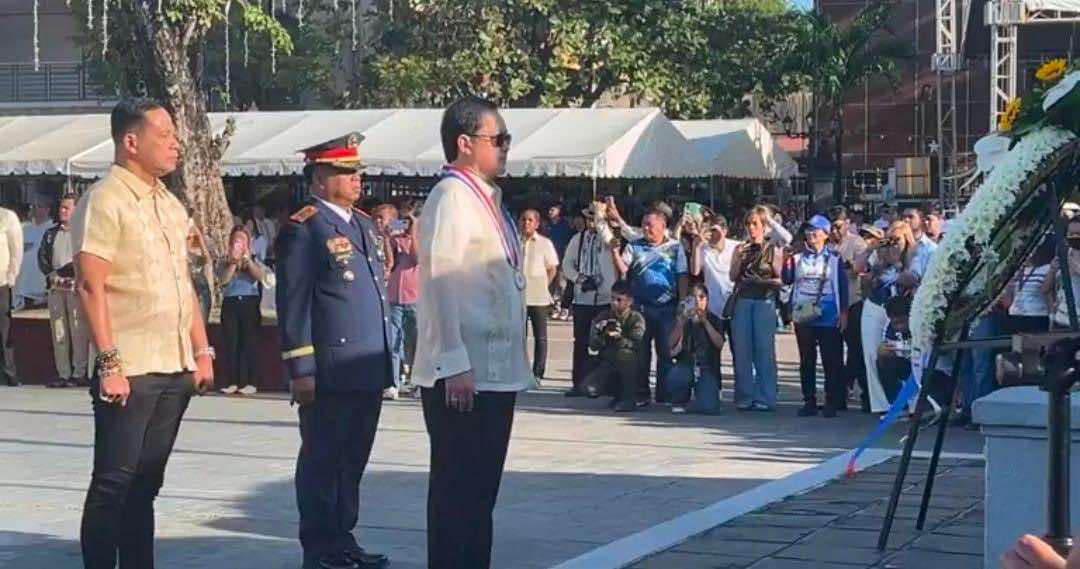Bulacan commemorates 126th anniversary of the Philippine Republic
The Bulacan provincial government commemorated the 126th anniversary of the Philippine Republic on Thursday, January 23, at the iconic Barasoain Church, a site of profound significance in Philippine history, reflecting on the theme “Kalayaan, Kinabukasan, Kasaysayan."

Governor Daniel Fernando and Vice Governor Alexis Castro led the commemoration, along with the guest of honor, Solicitor General Menardo I. Guevarra.
“This year’s celebration is a testament to our unwavering commitment to freedom, future, and history sacrifices made by our heroes and to reflect on the collective journey of our nation,” Fernando said.
The program commenced with a flag-raising ceremony, followed by the oath to the flag and the singing of the "Himno ng Pilipinas."
Participants took part in the "Panata ng Bagong Pilipinas" and in a wreath-laying ceremony to honor one of the nation's heroes.
Concluding the day was a tour of the NHCP-Museo ng Republika ng 1899, which showcases the rich history of the Philippine Republic.
Other guests who participated in the event were National Historical Commission of the Philippines Executive Director Carminda R. Arevalo, Philippine National Police Region III Regional director Police Brig. Gen. Jean S. Fajardo, City of Malolos Mayor Christian D. Natividad and Vice Mayor Miguel Alberto T. Bautista.
The First Philippine Republic Day Act, also known as Republic Act No. 11014, was passed by the Senate and the House of Representatives in 2016 and 2018.
In his speech, Solicitor General Guevarra asked: "Nasaan na tayo ngayon? Natamo na ba natin ang mga dakilang adhikain na nakaukit sa ating Saligang Batas? Sukatin natin ito sa pamamagitan ng tatlong pamantayan ng ating Saligang Batas, Kalayaan, Kaunlaran, at Katarungang Panlipunan." (Where are we now? Have we achieved the great aspirations enshrined in our Constitution? Let's measure it by the three standards of the present Constitution, Freedom, Prosperity, and Social Justice).
Guevarra pointed out that the first of the three standards of the present Constitution is freedom, wherein the definition is broad if it only means being free from the viewpoint to deal with other races. "We have experienced many rebellions and wars so our country can remain free. But the word Freedom has a deeper meaning, to be free from poverty, ignorance, and oppression of fellow Filipinos. We want to be free of the social structures that prevent our full fulfillment as people and citizenry."
Second is prosperity. He explained that our Constitution did not lack the rules to guide the drafting of Philippine laws. Many proposals aimed at stimulating the economy have been enacted.
Guevarra said that every year, the national budget grows larger and larger, and the growth of the country's gross domestic product is one of the highest in the region.
"Ngunit bakit lubog pa rin sa kahirapan ang higit na nakararami sa ating pamayanan? (But why is the majority of our community still mired in poverty?)," Guevarra asked.
He said the prosperity or the development of a place is not merely measured by its gross national product as more than this, the development of a country can be seen and felt in the daily life of the people such as having enough food, having a decent home, having protection against disease and education within reach.
Third is Social Justice. Guevarra shared that many provisions in our Constitution promote social justice such as giving equal opportunities for citizens to raise their standard of living, the right to receive public education, the right to be part of the health care system, and the right to run for government positions; but many of our countrymen are still suffering.
He said Malolos served as the revolutionary capital of the Philippines in the year 1899, wherein the Malolos Constitution formed the framework for the first government to be led by Filipinos.
Guevarra noted that the Malolos Constitution is the seed of subsequent Philippine Constitutions.
He said the 1935 Constitution during the Commonwealth prepared our independence as a country and embraced the principles of democracy, and the 1973 Constitution stabilized the framework of government and strengthened the rights of the people through the Bill of Rights.
The 1987 Constitution, meanwhile, is considered a revolutionary Constitution because it was born from the peaceful People's Revolution in 1986.
So, the Philippines has two Revolutionary Constitutions -- the Malolos Constitution of 1899 and the Philippine Constitution of 1987, he added.
Guevara thanked the provincial government of Bulacan headed by Governor Fernando for inviting him as the guest of honor of the event.